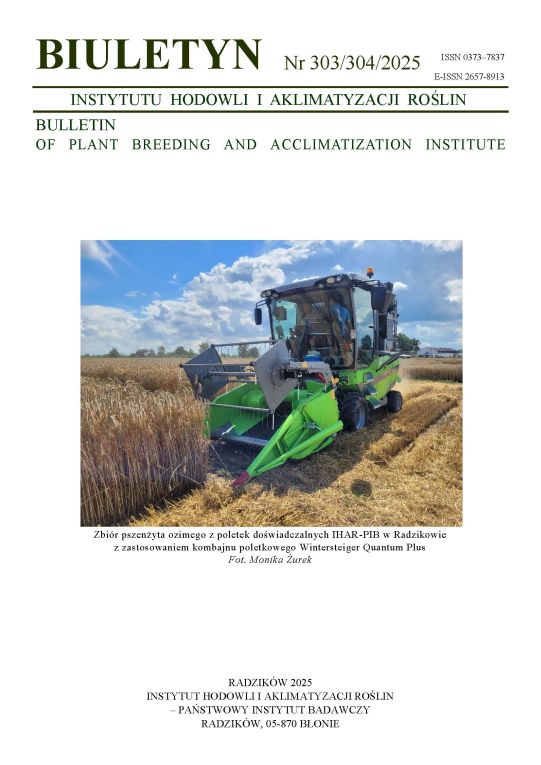The influence of sowing density and nitrogen application method on yielding and morphological characters of winter triticale cv. Woltario
Bogusława Jaśkiewicz
iung@iung.pulawy.plZakład Uprawy Roślin Zbożowych, Instytut Uprawy Nawożenia i Gleboznawstwa — Państwowy Instytut Badawczy w Puławach (Poland)
Abstract
Field experiments with triticale cv. Woltario were conducted in the years 2000–2003 at the Experiment Station Grabów belonging to the Institute of Soil Science and Plant Cultivation – State Research Institute. The aim of this research was to define influence of the nitrogen application method and sowing density on changes in the number of shoots and green leaves per plant of winter triticale cv. Woltario. Plots were located on a good wheat soil. Sowing densities: 100, 200, 300, 400 grain/ m2 and 3 nitrogen application methods (dose 120 kg N/ha) were applied. Optimal shoot number (4.4) and green leaves number (12) per plant at milky stage were stated under sowing density 200 grain per 1 m2. Under such conditions the highest grain yield of the triticale Woltario variety was harvested. Regression relations between grain yield as well as shoots and leaves number per plant show that we can form grain yield basing on the studied factors.
Keywords:
nitrogen application method, number of leaves, number of shoots, sowing densityReferences
Byszewski W. 1977. Biologiczne podstawy produkcyjności roślin. PWN, Warszawa.
Google Scholar
Cutforth H., W., Jame Y., W., Jefferson P. G. 1992. Effect of temperature, vernalization and water stress on phyllochron and final main-stem leaf number of HY320 and Neepawa spring wheat’s. Canadian Journal of Plant Science 72: 1141 — 1151.
Google Scholar
Frank A. B., Bauer A. 1995. Phyllochron differences in wheat, barley, and forage grasses. Crop Science 35: 19 — 23.
Google Scholar
Grabiński J. 1994. Wzrost, rozwój i plonowanie pszenżyta ozimego w zależności od głębokości i gęstości siewu oraz nawożenia azotowego. Zesz. Nauk. AR Szczecin nr 162 (58):49 — 54.
Google Scholar
Jaśkiewicz B. 1995. Wzrost, rozwój oraz plonowanie pszenżyta ozimego w zależności od terminu siewu i obsady roślin. Puławy. Seria R (328).
Google Scholar
Jaśkiewicz B. 2009. Plonowanie pszenżyta odmiany Woltario w zależności od gęstości siewu i sposobu nawożenia azotem. Acta Agrophysica. 13 (3), w druku.
Google Scholar
Jaśkiewicz B. 2008. Wpływ intensywności nawożenia i gęstości siewu na plonowanie pszenżyta ozimego odmiany Woltario. Acta Scient. Polon. 7 (2): 41 — 50.
Google Scholar
Nalborczyk E., Łoboda T., Pietkiewicz S. 1995. Photosynthetic indices of the canopy and grain yield. Fragm. Agronomica 2 (46): 98 — 99.
Google Scholar
Rozbicki J. 1997. Agrotechniczne uwarunkowania wzrostu, rozwoju i plonowania pszenżyta ozimego. Fundacja, Rozwój SGGW, Warszawa.
Google Scholar
Authors
Bogusława Jaśkiewicziung@iung.pulawy.pl
Zakład Uprawy Roślin Zbożowych, Instytut Uprawy Nawożenia i Gleboznawstwa — Państwowy Instytut Badawczy w Puławach Poland
Statistics
Abstract views: 254PDF downloads: 99
License
Copyright (c) 2009 Bogusława Jaśkiewicz

This work is licensed under a Creative Commons Attribution-ShareAlike 4.0 International License.
Upon submitting the article, the Authors grant the Publisher a non-exclusive and free license to use the article for an indefinite period of time throughout the world in the following fields of use:
- Production and reproduction of copies of the article using a specific technique, including printing and digital technology.
- Placing on the market, lending or renting the original or copies of the article.
- Public performance, exhibition, display, reproduction, broadcasting and re-broadcasting, as well as making the article publicly available in such a way that everyone can access it at a place and time of their choice.
- Including the article in a collective work.
- Uploading an article in electronic form to electronic platforms or otherwise introducing an article in electronic form to the Internet or other network.
- Dissemination of the article in electronic form on the Internet or other network, in collective work as well as independently.
- Making the article available in an electronic version in such a way that everyone can access it at a place and time of their choice, in particular via the Internet.
Authors by sending a request for publication:
- They consent to the publication of the article in the journal,
- They agree to give the publication a DOI (Digital Object Identifier),
- They undertake to comply with the publishing house's code of ethics in accordance with the guidelines of the Committee on Publication Ethics (COPE), (http://ihar.edu.pl/biblioteka_i_wydawnictwa.php),
- They consent to the articles being made available in electronic form under the CC BY-SA 4.0 license, in open access,
- They agree to send article metadata to commercial and non-commercial journal indexing databases.
Most read articles by the same author(s)
- Bogusława Jaśkiewicz, Growth dynamics of winter triticale cultivars Woltario and Krakowiak at different sowing densities , Bulletin of Plant Breeding and Acclimatization Institute: No. 245 (2007): Regular issue
- Bogusława Jaśkiewicz, Growth and plant mass accumulation of triticale Fidelio under different nitrogen fertilization and sowing rates , Bulletin of Plant Breeding and Acclimatization Institute: No. 231 (2004): Regular issue
- Bogusława Jaśkiewicz, Shaping of plant habit of spring barley varieties under different spectral composition of radiation , Bulletin of Plant Breeding and Acclimatization Institute: No. 236 (2005): Regular issue
- Bogusława Jaśkiewicz, Determination of agrotechnical requirements for new winter triticale varieties , Bulletin of Plant Breeding and Acclimatization Institute: No. 223/224 (2002): Regular Issue
- Bogusława Jaśkiewicz, The effectiveness of nitrogen fertilization of the winter triticale cultivar Fidelio in relation to sowing density , Bulletin of Plant Breeding and Acclimatization Institute: No. 218/219 (2001): Regular Issue













